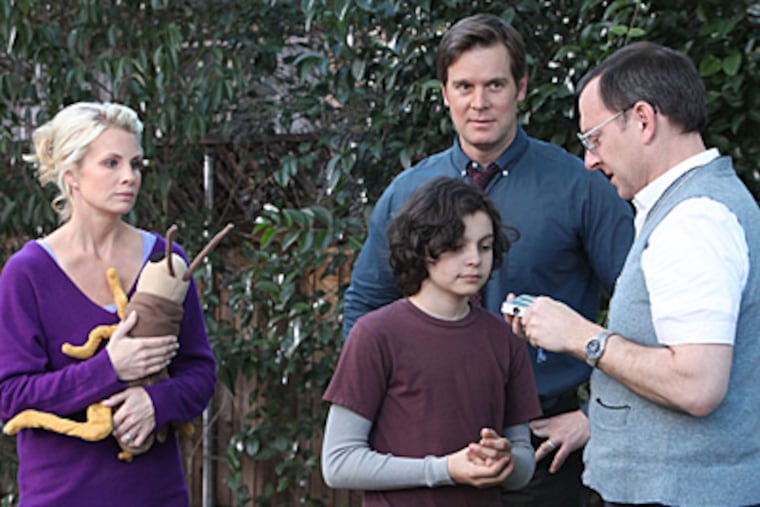TV's "Parenthood" mostly gets Asperger's right
They have all been there. Trying to explain to grandparents that their child is not rude or spoiled. Enduring the judgmental stares of strangers. Hoping kids at school won't be mean.

They have all been there.
Trying to explain to grandparents that their child is not rude or spoiled. Enduring the judgmental stares of strangers. Hoping kids at school won't be mean.
They are parents of children with Asperger's syndrome, and now they can see a portrayal of their lives on TV.
The NBC series is called Parenthood. It depicts Max, a young boy with the syndrome, and parents of real-life "aspies" say the show mostly gets it right.
"Ever since the first episode of Parenthood, it's been: 'Hey, did you see it this past week?' " said Cherry Hill resident Debbie Schmidt, whose son Jordan has the syndrome. "It's being watched by many of us."
Asperger's syndrome, named for the Austrian doctor who identified it in the 1940s, is often called a high-functioning form of autism. Typical symptoms include difficulty with social interactions and inability to respond to the emotions of others. People with the syndrome may be inflexible about routines and display an extreme focus on a narrow range of topics, while having average or above-average intelligence.
Hollywood has portrayed others with these symptoms. Among them is Sheldon on the current CBS show Big Bang Theory, an adult who is not identified as having Asperger's syndrome yet is frequently cited as such by those in the Asperger's community.
But Parenthood is rare in that it depicts a child with the syndrome, showing viewers the emotional ups and downs as his parents grapple with the diagnosis, therapists, school, and relatives.
"They really are portraying it in a way that we all kind of have been there, cried through it, tried to figure it out," said Schmidt, a facilitator for the Burlington-Camden chapter of ASPEN, a New Jersey-based support group for Asperger's syndrome and other forms of high-functioning autism.
Some scenes have really hit home. There's the episode where Max is not invited to a birthday party. And the one where he refuses to help his grandfather put up a tent, repeating over and over in a dispassionate voice that he just wants to look for bugs. In another, he gets upset because someone has too many items in a grocery's express line.
"It's hard for the casual observer to understand," said Deirdre Wright, president of ASCEND, the Asperger & Autism Alliance for Greater Philadelphia. "Your child does something in a public place and others are thinking, 'Why can't that parent control that child?' "
She recalled that years ago, her son with Asperger's had a similar "meltdown" at the grocery store because the trip deviated from his routine of going straight home after kindergarten.
The show's realism may be no surprise, as executive producer Jason Katims has a son with the syndrome.
Still, parents and educators have some quibbles with the show, which airs Tuesdays at 10 p.m. and is in its second season. When Max has a tantrum, sometimes it is resolved in unrealistically short order. And his parents seem to navigate the complex process of arranging therapy and schooling with little difficulty.
In addition, Max should not be seen as representing all children with Asperger's syndrome, said Susan Epstein, a clinical neuropsychologist at the Children's Hospital of Philadelphia.
"You could have kids with Asperger's who are a lot less talkative and a lot more odd than he is, who are a lot less socially motivated than he is," Epstein said. "In a lot of ways, he's kind of the top of the top of the heap."
Teachers at the Nexus School in Huntingdon Valley, which serves students on the autism spectrum, agreed, though they said many elements of the show rang true.
It's a television show with many characters, so inevitably much is compressed, said Tara Smith, an occupational therapist at Nexus.
"I think they're trying," Smith said. "I think it would be hard to make it realistic and show all the other things on the show with the other characters."
Some parents of children with Asperger's say they are thrilled just to have the subject treated in a compassionate way, which they hope will lead to greater understanding. Gone are the days when the public's idea of autism was limited to Dustin Hoffman's character in the 1988 movie Rain Main, said Deborah Hill, coordinator of the Burlington-Camden chapter of ASPEN.
"It's great that it really makes it known to the masses," said Hill, of Mount Laurel, whose daughter Lauren was found to have Asperger's syndrome a decade ago.
But as the name suggests, Parenthood may appeal to parents the most. Now 22 and attending college part time, Lauren is not much interested in the show.
Instead, her mother said, she likes Harry Potter.